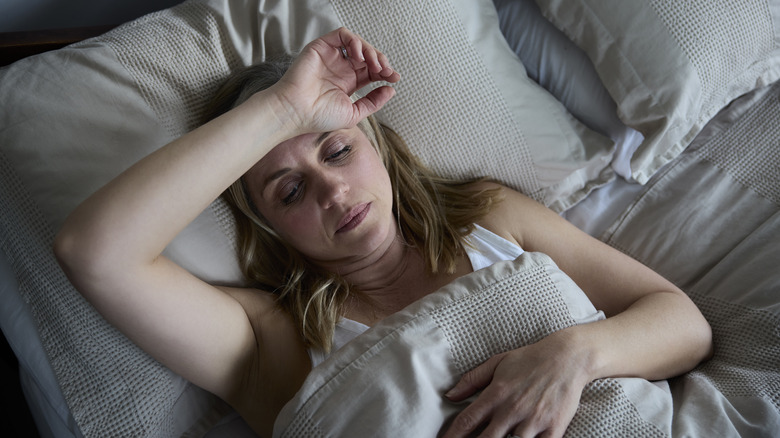People take hormonal birth control for a number of reasons — preventing pregnancy, treating acne, and navigating health conditions like polycystic ovarian syndrome (PCOS) are some of the few. But just like there are side effects to being on the pill, there are physical and mental health changes you may notice when you come off it too. Everything from your sex drive and acne situation to your mood and menstrual cycle can be affected.
Turns out your sleep can be impacted too when you stop taking birth control pills. As explained by an OB/GYN and associate professor at the University of Nebraska College of Medicine in Omaha, Dr. Karen Carlson (via Everyday Health), the hormonal changes that arise from going off the pill can affect women differently when it comes to sleep. Some may sleep more soundly.
For example, according to a 2024 study published in the journal Sleep Science, women on hormonal contraception reported poor quality sleep and women on non-hormonal contraceptives reported higher sleep efficiency — the amount of time they spent asleep. However, in a 2024 study published in the International Journal of Gynecology & Obstetrics, hormonal contraceptives were linked with higher sleep efficiency. While it’s hard to pinpoint exactly how coming off the pill could influence sleep for you personally, experts do think that hormonal birth control pills cause changes in your hormones and related systems that could contribute to poor sleep.
Body temperature, circadian clock, and sleep quality

Birth control pills do more than influence changes in sex hormones — estrogen and progesterone — within your body. They also cause changes in body temperature. It is not uncommon to experience changes in your basal body temperature when you’re on birth control. In fact, being on hormonal birth control could cause temperature changes similar to what women experience after they ovulate (the luteal stage of the menstrual cycle) and this can cause insomnia.
Additionally, being on the pill can mess with your sleep-wake cycle, per experts. OB/GYN, Dr. Jasmine Pedroso told Well+Good that synthetic hormones found in hormonal birth control pills can affect your existing estrogen and progesterone levels and mess with your body’s natural circadian clock. This might mean bad quality sleep, difficulty getting to sleep, or trouble staying asleep. So one could assume, that stopping the pill can lead to a better quality of sleep.
But like we said before, what happens to your sleep when you stop taking birth control can be a very individual experience, based on your existing hormone levels, your sleep hygiene habits, your mental health, and other lifestyle factors. That being said, if you’re on a hormonal birth control pill and you’re experiencing sleep troubles, should you stop taking them?
Handling poor sleep quality when using birth control pills
Since a lot of factors come into play where sleep is concerned, you may have to do some investigation and isolate particulars to see exactly what is causing your insomnia, troubled sleep, or poor sleep efficiency.
Are you consuming caffeine too close to bedtime? Is your wine-drinking habit disrupting your sleep? Are you eating too close to bedtime? Your mental health and any underlying health conditions could be the culprits too. Adjusting each of these to see what happens to your sleep can help. Eating the right foods, your sleep hygiene habits, stress, and sleep environment would all have to be considered.
If it helps, discuss your concerns with your OB/GYN or a sleep specialist before stopping hormonal birth control or switching to a different contraceptive. At the end of the day, hormonal birth control pills aren’t the only form of contraception out there. Non-hormonal contraceptive methods like the copper IUD and condoms are some other alternatives. Stopping birth control, for whatever reason, comes with its side effects, so it’s best to discuss them with your healthcare provider and be aware of them. Sleep is important for a lot of reasons — memory consolidation, energy levels, and immunity being some of them — so it makes sense that you’d want to look into whatever it is that could be causing disturbances in your snooze time.